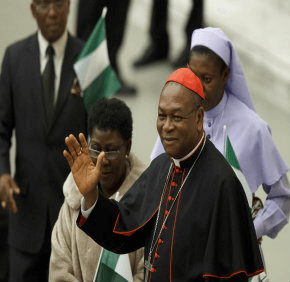By Carol Glatz
Catholic News Service
VATICAN CITY – If Jesus had wanted a church free of scandal or problems, he would have put it in the hands of angels, not a humanity he loved, said Nigeria’s newest cardinal elector.
“If you say the church needs to reform and improve, it would be the first to admit it, because the church has never reached the end of its journey; the church is always under reform,” Cardinal John Olorunfemi Onaiyekan of Abuja, Nigeria, told Catholic News Service.
Even successful changes or improvements don’t signal the job of conversion “is done and finished once and for all, because every generation has to go through its own reforms,” he said on the sidelines of pre-conclave meetings March 6.
Elevated to the College of Cardinals less than three months ago, Cardinal Onaiyekan, 69, downplayed the media’s focus on some cardinals reportedly being concerned about the findings of an internal investigation of charges of corruption and financial mismanagement within the Vatican. Retired Pope Benedict XVI said the dossier compiled by a three-cardinal commission should be seen only by the next pope.
Cardinal Onaiyekan said, “I do believe that very often there’s a tendency to exaggerate the gravity and even the moment (importance) of the problems we have in our house today. Anyone who has read church history knows that there is nothing new on that.”
Problems or accusations of scandal or corruption should be addressed, he said, “but that only proves that the church is made of human beings.”
“Jesus Christ could have left this church in the hands of angels; there were enough in heaven to do the job,” he said.
Instead, with his love and hope for humanity, he put the church in the hands of 12 ignorant men, who included simple fishermen and a tax collector, he said.
He said the church shouldn’t be concerned with being “credible,” in the sense of its message being believed or accepted by everyone.
“There are people to whom my message will never be credible, because they will never believe me because they don’t believe” in God.
“You can’t be credible to everybody. Authentic, yes, but authentic means a message that is as close as possible to the message of Jesus; that I’m worried about,” he said.
“The church cannot go around, obviously, all the time trying to be popular, to be acceptable” to the views, positions and opinion of journalists and the dominant culture, he said.
But that “doesn’t mean that we go out of our way to be difficult to understand, no. We do our best to explain as much as we can” and face the challenge of making the message seem as relevant as possible.
“Even Jesus didn’t have it easy explaining to the people of his day what his message was about,” he said.
Cardinal Onaiyekan said he was not going into the conclave clearly decided on for whom he would cast his vote.
“We believe firmly that the period of the conclave is a special period of grace and that the Holy Spirit will lead us,” he said.
The Holy Spirit, too, will inspire or guide the new pope in discerning how he will carry out his ministry and what “is most required in our days,” he said.
“One pope is different from another. When the pope comes, he will (take) his own path, he will do his work, carry out his ministry according to the way he is led by the spirit,” the cardinal said.
The College of Cardinals does not “democratically” represent the face of church on the ground, he said.
But church leaders from all over the world come together at synods or other large gatherings to share the hopes and concerns of their local churches “and that is what makes the church catholic” and helps everyone get “on board,” he said.
That means the nationality of a new pope is not important, he said.
“What is important is that whoever is the pope should be a pope for all of us” not just his own nation or continent of origin, he said.
The conclave to elect a new successor of Peter “is one of the highest points of our faith in the church as (led) by the Lord Jesus.”
“If we really want to live up to that, then we should keep as close as we can to Jesus throughout this process,” especially through prayer, he said.
See also:
Copyright (c) 2013 Catholic News Service/U.S. Conference of Catholic Bishops


